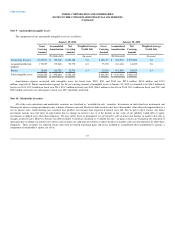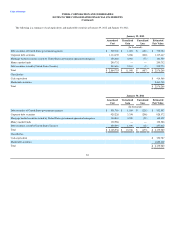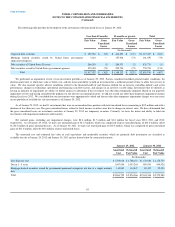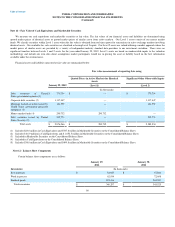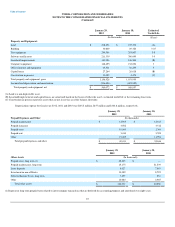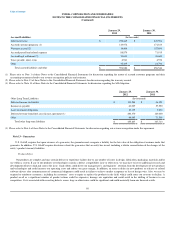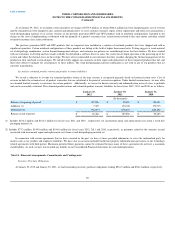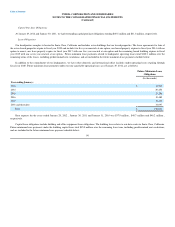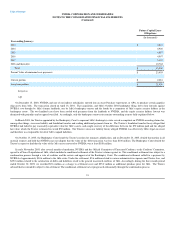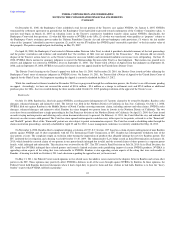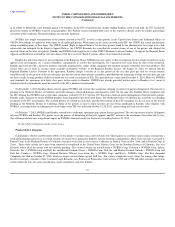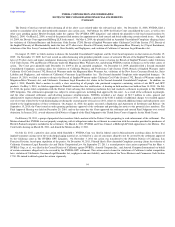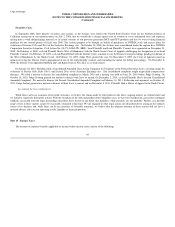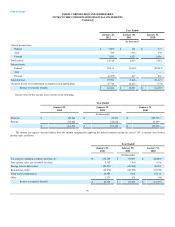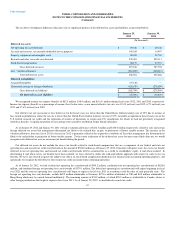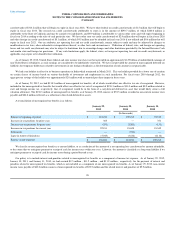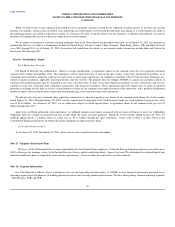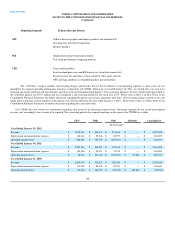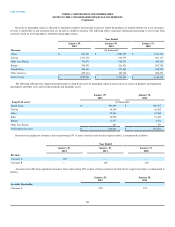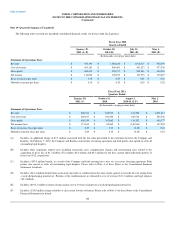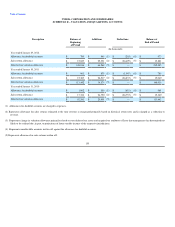NVIDIA 2012 Annual Report Download - page 96
Download and view the complete annual report
Please find page 96 of the 2012 NVIDIA annual report below. You can navigate through the pages in the report by either clicking on the pages listed below, or by using the keyword search tool below to find specific information within the annual report.
Table of Contents NVIDIA CORPORATION AND SUBSIDIARIES
NOTES TO THE CONSOLIDATED FINANCIAL STATEMENTS
(Continued)
in its ability to defend the cases brought against it by Rambus. In the ITC's Final Decision, despite finding Rambus acted in bad faith, the ITC incorrectly
placed the burden on NVIDIA to prove actual prejudice. The Federal Circuit remanded both cases to the respective district courts for further proceedings
consistent with its opinions. Those proceedings are currently underway.
NVIDIA also sought reexamination of the patents asserted in the ITC, as well as other patents, in the United States Patent and Trademark Office, or
USPTO. Proceedings are underway with respect to all challenged patents. With respect to the claims asserted in the ITC, the USPTO has issued a preliminary
ruling invalidating many of the claims. The USPTO issued "Right to Appeal Notices" for the three patents found by the administrative law judge to be valid,
enforceable and infringed. In the Right to Appeal Notices, the USPTO Examiner has cancelled all asserted claims of one of the patents and allowed the
asserted claims on the other two patents. Rambus and NVIDIA both sought review of the USPTO Examiner's adverse findings. On appeal, the Board of Patent
Appeals and Interferences found the relevant claims of the three asserted “Barth I” patents subject to reexamination invalid.
Rambus has also been subject to an investigation in the European Union. NVIDIA was not a party to that investigation, but has sought to intervene in the
appeal of the investigation. As a result of Rambus' commitments to resolve that investigation, for a period of five years from the date of the resolution,
Rambus must now provide a license to memory controller manufacturers, sellers and/or companies that integrate memory controllers into other products. The
license terms are set forth in a license made available on Rambus' website, or the Required Rambus License. On August 12, 2010, we entered into the
Required Rambus License. Pursuant to the agreement, Rambus charges a royalty of (i) one percent of the net sales price per unit for certain memory
controllers and (ii) two percent of the net sales price per unit for certain other memory controllers, provided that the maximum average net sales price per unit
for these royalty bearing products shall be deemed not to exceed a maximum of $20. The agreement has a term until December 9, 2014. However, NVIDIA
may terminate the agreement with thirty days prior written notice to Rambus. NVIDIA has already provided written notice to Rambus of its' intent to
terminate effective immediately upon the removal of the ITC's limited exclusion order.
On December 1, 2010, Rambus filed a lawsuit against NVIDIA and several other companies alleging six claims for patent infringement. This lawsuit is
pending in the Northern District of California and seeks damages, enhanced damages and injunctive relief. On the same day, Rambus filed a complaint with
the ITC alleging that NVIDIA and several other companies violated 19 U.S.C. Section 1337 based on a claim of patent infringement of three Rambus patents.
Rambus seeks exclusion of certain NVIDIA products from importation into the United States. The Northern District of California has stayed the case pending
resolution of the ITC investigation. The asserted patents are related to each other, and the three patents in the ITC complaint are also at issue in the lawsuit
pending in the Northern District of California. Many of the patents at issue in these lawsuits are also being challenged in Rambus' other disputes with
NVIDIA. A hearing before an Administrative Law Judge of the ITC was held from October 12-20, 2011, and no ruling has been issued to date.
On February 7, 2012, NVIDIA and Rambus entered into a settlement agreement and a patent license agreement. The two agreements resolve all disputes
between NVIDIA and Rambus. The parties are in the process of dismissing all lawsuits, appeals, and ITC actions to the maximum extent allowable by law.
The settlement did not have a significant impact on NVIDIA's financial results for the fiscal year ending January 29, 2012.
Product Defect Litigation and Securities Cases
Product Defect Litigation
In September, October and November 2008, several putative consumer class action lawsuits were filed against us, asserting various claims arising from a
weak die/packaging material set in certain versions of our previous generation products used in notebook configurations. Most of the lawsuits were filed in
Federal Court in the Northern District of California, but three were filed in state court in California, in Federal Court in New York, and in Federal Court in
Texas. Those three actions have since been removed or transferred to the United States District Court for the Northern District of California, San Jose
Division, where all of the actions now are currently pending. The various lawsuits are titled Nakash v. NVIDIA Corp., Feinstein v. NVIDIA Corp., Inicom
Networks, Inc. v. NVIDIA Corp. and Dell, Inc. and Hewlett Packard, Olivos v. NVIDIA Corp., Dell, Inc. and Hewlett Packard, Sielicki v. NVIDIA Corp. and
Dell, Inc., Cormier v. NVIDIA Corp., National Business Officers Association, Inc. v. NVIDIA Corp., and West v. NVIDIA Corp. The First Amended
Complaint was filed on October 27, 2008, which no longer asserted claims against Dell, Inc. The various complaints assert claims for, among other things,
breach of warranty, violations of the Consumer Legal Remedies Act, Business & Professions Code sections 17200 and 17500 and other consumer protection
statutes under the laws of various jurisdictions, unjust enrichment, and strict liability.
93


